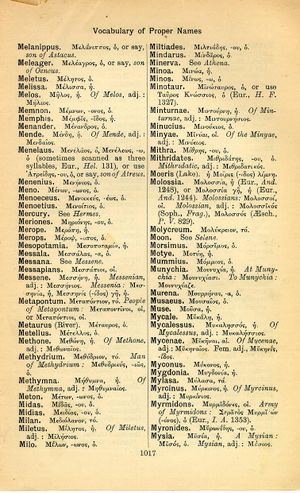Mycenae
Πολλοῖς ὁ Δαίμων, οὐ κατ' εὔνοιαν φέρων, / Μεγάλα δίδωσιν εὐτυχήματ' ... (Euripides) → God brings great good fortune to many, not out of good will,...
English > Greek (Woodhouse)
Μυκῆναι, αἱ.
Of Mycenae, adj.: Μυκηναῖος. Fem. adj., Μυκηνίς, -ίδος.
Latin > English (Lewis & Short)
Mycēnae: ārum, or Mycēna, ae, and Mycēne, ēs, f., = Μυκηναι, Μυκήνη,
I a celebrated city in Argolis, of which Agamemnon was king: Agamemnoniaeque Mycenae, Verg. A. 6, 838; Ov. M. 6, 414; 15, 426 al.: deprensus urbe Mycenae, Verg. A. 5, 52: Diti sacrata, Auct. Priap. 77: ante Agamemnoniam ... Mycenen, Sil. 1, 27.—
II Derivv.
A Mycēnaeus, a, um, adj., of or belonging to Mycenæ, Mycenæan: ductor, i. e. Agamemnon, Verg. A. 11, 266: teque, Mycenaeo, Phoebas, amata duci, i. e. Cassandra, beloved by Agamemnon, king of Mycenæ, Ov. Tr. 2, 400: manus, i. e. Agamemnonis, id. H. 5, 2: rates, the Grecian fleet, under the command of Agamemnon, Prop. 3, 15, 32.—
B Mycēnensis, e, adj., of or belonging to Mycenæ, Mycenæan.—In plur.: Mycēnenses, ĭum, m., the inhabitants of Mycenæ, the Mycenæans, Cic. poët. Fin. 2, 6, 18.—
C Mycēnis, ĭdis, f., the Mycenæan, i. e. Iphigenia, daughter of Agamemnon: suppositā fertur mutāsse Mycenida cervā, Ov. M. 12, 34.
Latin > French (Gaffiot 2016)
Mўcēnæ, ārum, f. (Μυκῆναι), Mela 2, 41 ; Virg. En. 6, 838, Mўcēnē, ēs, f., Sil. 1, 77, et Mўcēna, æ, f. Virg. En. 5, 52, Mycènes, ville d’Argolide, résidence d’Agamemnon || -næus, a, um, de Mycènes : Virg. En. 11, 266 ; Ov. Tr. 2, 1, 400 || -nēnsēs, ĭum, habitants de Mycènes : [poet.] Cic. Fin. 2, 18.

